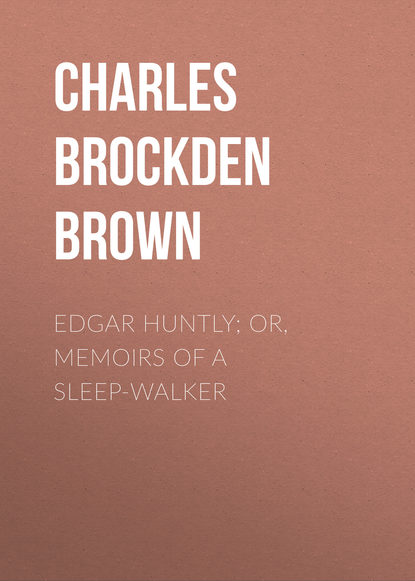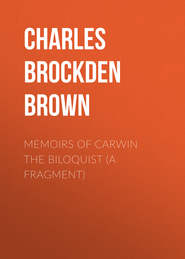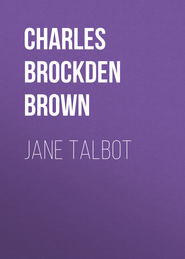По всем вопросам обращайтесь на: info@litportal.ru
(©) 2003-2024.
✖
Edgar Huntly; or, Memoirs of a Sleep-Walker
Настройки чтения
Размер шрифта
Высота строк
Поля
It was resolved that I should accompany my master in his travels, in quality of favourite domestic. My principles, whatever might be their rectitude, were harmonious and flexible. I had devoted my life to the service of my patron. I had formed conceptions of what was really conducive to his interest, and was not to be misled by specious appearances. If my affection had not stimulated my diligence, I should have found sufficient motives in the behaviour of his mother. She condescended to express her reliance on my integrity and judgment. She was not ashamed to manifest, at parting, the tenderness of a mother, and to acknowledge that all her tears were not shed on her son's account. I had my part in the regrets that called them forth.
During our absence, I was my master's constant attendant. I corresponded with his mother, and made the conduct of her son the principal theme of my letters. I deemed it my privilege, as well as duty, to sit in judgment on his actions, to form my opinions without regard to selfish considerations, and to avow them whenever the avowal tended to benefit. Every letter which I wrote, particularly those in which his behaviour was freely criticized, I allowed him to peruse. I would, on no account, connive at or participate in the slightest irregularity. I knew the duty of my station, and assumed no other control than that which resulted from the avoiding of deceit, and the open expression of my sentiments. The youth was of a noble spirit, but his firmness was wavering. He yielded to temptations which a censor less rigorous than I would have regarded as venial, or, perhaps, laudable. My duty required me to set before him the consequences of his actions, and to give impartial and timely information to his mother.
He could not brook a monitor. The more he needed reproof the less supportable it became. My company became every day less agreeable, till at length there appeared a necessity of parting. A separation took place, but not as enemies. I never lost his respect. In his representations to his mother, he was just to my character and services. My dismission was not allowed to injure my fortune, and his mother considered this event merely as a new proof of the inflexible consistency of my principles.
On this change in my situation, she proposed to me to become a member of her own family. No proposal could be more acceptable. I was fully acquainted with the character of this lady, and had nothing to fear from injustice and caprice. I did not regard her with filial familiarity, but my attachment and reverence would have done honour to that relation. I performed for her the functions of a steward. Her estates in the city were put under my direction. She placed boundless confidence in my discretion and integrity, and consigned to me the payment, and, in some degree, the selection and government, of her servants. My station was a servile one, yet most of the evils of servitude were unknown to me. My personal ease and independence were less infringed than that of those who are accounted the freest members of society. I derived a sort of authority and dignity from the receipt and disbursement of money. The tenants and debtors of the lady were, in some respects, mine. It was, for the most part, on my justice and lenity that they depended for their treatment. My lady's household-establishment was large and opulent. Her servants were my inferiors and menials. My leisure was considerable, and my emoluments large enough to supply me with every valuable instrument of improvement or pleasure.
These were reasons why I should be contented with my lot. These circumstances alone would have rendered it more eligible than any other, but it had additional and far more powerful recommendations, arising from the character of Mrs. Lorimer, and from the relation in which she allowed me to stand to her.
How shall I enter upon this theme? How shall I expatiate upon excellencies which it was my fate to view in their genuine colours, to adore with an immeasurable and inextinguishable ardour, and which, nevertheless, it was my hateful task to blast and destroy? Yet I will not be spared. I shall find, in the rehearsal, new incitements to sorrow. I deserve to be supreme in misery, and will not be denied the full measure of a bitter retribution.
No one was better qualified to judge of her excellencies. A casual spectator might admire her beauty, and the dignity of her demeanour. From the contemplation of those, he might gather motives for loving or revering her. Age was far from having withered her complexion, or destroyed the evenness of her skin; but no time could rob her of the sweetness and intelligence which animated her features. Her habitual beneficence was bespoken in every look. Always in search of occasions for doing good, always meditating scenes of happiness, of which she was the author, or of distress, for which she was preparing relief, the most torpid insensibility was, for a time, subdued, and the most depraved smitten by charms of which, in another person, they would not perhaps have been sensible.
A casual visitant might enjoy her conversation, might applaud the rectitude of her sentiments, the richness of her elocution, and her skill in all the offices of politeness. But it was only for him who dwelt constantly under the same roof, to mark the inviolable consistency of her actions and opinions, the ceaseless flow of her candour, her cheerfulness, and her benevolence. It was only for one who witnessed her behaviour at all hours, in sickness and in health, her management of that great instrument of evil and good, money, her treatment of her son, her menials, and her kindred, rightly to estimate her merits.
The intercourse between us was frequent, but of a peculiar kind. My office in her family required me often to see her, to submit schemes to her consideration, and receive her directions. At these times she treated me in a manner in some degree adapted to the difference of rank and the inferiority of my station, and yet widely dissimilar from that which a different person would have adopted in the same circumstances. The treatment was not that of an equal and a friend, but still more remote was it from that of a mistress. It was merely characterized by affability and condescension, but as such it had no limits.
She made no scruple to ask my counsel in every pecuniary affair, to listen to my arguments, and decide conformably to what, after sufficient canvassings and discussions, should appear to be right. When the direct occasions of our interview were dismissed, I did not of course withdraw. To detain or dismiss me was indeed at her option; but, if no engagement interfered, she would enter into general conversation. There was none who could with more safety to herself have made the world her confessor; but the state of society in which she lived imposed certain limitations on her candour. In her intercourse with me there were fewer restraints than on any other occasion. My situation had made me more intimately acquainted with domestic transactions, with her views respecting her son, and with the terms on which she thought proper to stand with those whom old acquaintance or kindred gave some title to her good offices. In addition to all those motives to a candid treatment of me, there were others which owed their efficacy to her maternal regard for me, and to the artless and unsuspecting generosity of her character.
Her hours were distributed with the utmost regularity, and appropriated to the best purposes. She selected her society without regard to any qualities but probity and talents. Her associates were numerous, and her evening conversations embellished with all that could charm the senses or instruct the understanding. This was a chosen field for the display of her magnificence; but her grandeur was unostentatious, and her gravity unmingled with haughtiness. From these my station excluded me; but I was compensated by the freedom of her communications in the intervals. She found pleasure in detailing to me the incidents that passed on those occasions, in rehearsing conversations and depicting characters. There was an uncommon portion of dramatic merit in her recitals, besides valuable and curious information. One uniform effect was produced in me by this behaviour. Each day I thought it impossible for my attachment to receive any new accessions, yet the morrow was sure to produce some new emotion of respect or of gratitude, and to set the unrivalled accomplishments of this lady in a new and more favourable point of view. I contemplated no change in my condition. The necessity of change, whatever were the alternative, would have been a subject of piercing regret. I deemed my life a cheap sacrifice in her cause. No time would suffice to discharge the debt of gratitude that was due to her. Yet it was continually accumulating. If an anxious thought ever invaded my bosom, it arose from this source.
It was no difficult task faithfully to execute the functions assigned to me. No merit could accrue to me from this source. I was exposed to no temptation. I had passed the feverish period of youth. No contagious example had contaminated my principles. I had resisted, the allurements of sensuality and dissipation incident to my age. My dwelling was in pomp and splendour. I had amassed sufficient to secure me, in case of unforeseen accidents, in the enjoyment of competence. My mental resources were not despicable, and the external means of intellectual gratification were boundless. I enjoyed an unsullied reputation. My character was well known in that sphere which my lady occupied, not only by means of her favourable report, but in numberless ways in which it was my fortune to perform personal services to others.
Chapter V
Mrs. Lorimer had a twin-brother. Nature had impressed the same image upon them, and had modelled them after the same pattern. The resemblance between them was exact to a degree almost incredible. In infancy and childhood they were perpetually liable to be mistaken for each other. As they grew up, nothing, to a superficial examination, appeared to distinguish them, but the sexual characteristics. A sagacious observer would, doubtless, have noted the most essential differences. In all those modifications of the features which are produced by habits and sentiments, no two persons were less alike. Nature seemed to have intended them as examples of the futility of those theories which ascribe every thing to conformation and instinct and nothing to external circumstances; in what different modes the same materials may be fashioned, and to what different purposes the same materials may be applied. Perhaps the rudiments of their intellectual character, as well as of their form, were the same; but the powers that in one case were exerted in the cause of virtue were, in the other, misapplied to sordid and flagitious purposes.
Arthur Wiatte (that was his name) had ever been the object of his sister's affection. As long as he existed, she never ceased to labour in the promotion of his happiness. All her kindness was repaid by a stern and inexorable hatred. This man was an exception to all the rules which govern us in our judgments of human nature. He exceeded in depravity all that has been imputed to the arch-foe of mankind. His wickedness was without any of those remorseful intermissions from which it has been supposed that the deepest guilt is not entirely exempt. He seemed to relish no food but pure unadulterated evil. He rejoiced in proportion to the depth of that distress of which he was the author.
His sister, by being placed most within the reach of his enmity, experienced its worst effects. She was the subject on which, by being acquainted with the means of influencing her happiness, he could try his malignant experiments with most hope of success. Her parents being high in rank and wealth, the marriage of their daughter was, of course, an object of anxious attention. There is no event on which our felicity and usefulness more materially depends, and with regard to which, therefore, the freedom of choice and the exercise of our own understanding ought to be less infringed; but this maxim is commonly disregarded in proportion to the elevation of our rank and extent of our property.
The lady made her own election; but she wras one of those who acted on a comprehensive plan, and would not admit her private inclination to dictate her decision. The happiness of others, though founded on mistaken views, she did not consider as unworthy of her regard. The choice was such as was not likely to obtain the parental sanction, to whom the moral qualities of their son-in-law, though not absolutely weightless in the balance, were greatly inferior to the considerations of wealth and dignity.
The brother set no value on any thing but the means of luxury and power. He was astonished at that perverseness which entertained a different conception of happiness from himself. Love and friendship he considered as groundless and chimerical, and believed that those delusions would, in people of sense, be rectified by experience; but he knew the obstinacy of his sister's attachment to these phantoms, and that to bereave her of the good they promised was the most effectual means of rendering her miserable. For this end he set himself to thwart her wishes. In the imbecility and false indulgence of his parents he found the most powerful auxiliaries. He prevailed upon them to forbid that union which wanted nothing but their concurrence, and their consent to endow her with a small portion of their patrimony, to render completely eligible. The cause was that of her happiness and the happiness of him on whom she had bestowed her heart. It behooved her, therefore, to call forth all her energies in defence of it, to weaken her brother's influence on the minds of her parents, or to win him to be her advocate. When I reflect upon her mental powers, and the advantages which should seem to flow from the circumstance of pleading in the character of daughter arid sister, I can scarcely believe that her attempts miscarried. I should have imagined that all obstacles would yield before her, and particularly in a case like this, in which she must have summoned all her forces, and never have believed that she had struggled sufficiently.
Certain it is that her lot was fixed. She was not only denied the husband of her choice, but another was imposed upon her, whose recommendations were irresistible in every one's apprehension but her own. The discarded lover was treated with every sort of contumely. Deceit and violence were employed by her brother to bring his honour, his liberty, and even his life, into hazard. All these iniquities produced no inconsiderable effect on the mind of the lady. The machinations to which her love was exposed would have exasperated him into madness, had not her most strenuous exertions been directed to appease him.
She prevailed on him at length to abandon his country, though she thereby merely turned her brother's depravity into a new channel. Her parents died without consciousness of the evils they inflicted, but they experienced a bitter retribution in the conduct of their son. He was the darling and stay of an ancient and illustrious house, but his actions reflected nothing but disgrace upon his ancestry, and threatened to bring the honours of their line to a period in his person. At their death the bulk of their patrimony devolved upon him. This he speedily consumed in gaming and riot. From splendid he descended to meaner vices. The efforts of his sister to recall him to virtue were unintermitted and fruitless. Her affection for him he converted into a means of prolonging his selfish gratifications. She decided for the best. It was no argument of weakness that she was so frequently deceived. If she had judged truly of her brother, she would have judged not only without example, but in opposition to the general experience of mankind. But she was not to be forever deceived. Her tenderness was subservient to justice. And when his vices had led him from the gaming-table to the highway, when seized at length by the ministers of law, when convicted and sentenced to transportation, her intercession was solicited, when all the world knew that pardon would readily be granted to a suppliant of her rank, fortune, and character, when the criminal himself, his kindred, his friends, and even indifferent persons, implored her interference, her justice was inflexible. She knew full well the incurableness of his depravity; that banishment was the mildest destiny that would befall him; that estrangement from ancient haunts and associates was the condition from which his true friends had least to fear. Finding entreaties unavailing, the wretch delivered himself to the suggestions of his malice, and he vowed to be bloodily revenged on her inflexibility. The sentence was executed. That character must indeed be monstrous from which the execution of such threats was to be dreaded. The event sufficiently showed that our fears on this head were well grounded. This event, however, was at a great distance. It was reported that the felons, of whom he was one, mutinied on board the ship in which they had been embarked. In the affray that succeeded, it was said that he was killed.
Among the nefarious deeds which he perpetrated was to be numbered the seduction of a young lady, whose heart was broken by the detection of his perfidy. The fruit of this unhappy union was a daughter. Her mother died shortly after her birth. Her father was careless of her destiny. She was consigned to the care of a hireling, who, happily for the innocent victim, performed the maternal offices for her own sake, and did not allow the want of a stipulated recompense to render hor cruel or neglectful.
This orphan was sought out by the benevolence of Mrs. Lorimer and placed under her own protection. She received from her the treatment of a mother. The ties of kindred, corroborated by habit, was not the only thing that united them. That resemblance to herself which had been so deplorably defective in her brother was completely realized in his offspring. Nature seemed to have precluded every difference between them but that of age. This darling object excited in her bosom more than maternal sympathies. Her soul clung to the happiness of her Clarice with more ardour than to that of her own son. The latter was not only less worthy of affection, but their separation necessarily diminished their mutual confidence.
It was natural for her to look forward to the future destiny of Clarice. On these occasions she could not help contemplating the possibility of a union between her son and niece. Considerable advantages belonged to this scheme, yet it was the subject of hope rather than the scope of a project. The contingencies were numerous and delicate on which the ultimate desirableness of this union depended. She was far from certain that her son would be worthy of this benefit, or that, if he were worthy, his propensities would not select for themselves a different object. It was equally dubious whether the young lady would not think proper otherwise to dispose of her affections. These uncertainties could be dissipated only by time. Meanwhile she was chiefly solicitous to render them virtuous and wise.
As they advanced in years, the hopes that she had formed were annihilated. The youth was not exempt from egregious errors. In addition to this, it was manifest that the young people were disposed to regard each other in no other light than that of brother and sister. I was not unapprized of her views. I saw that their union was impossible. I was near enough to judge of the character of Clarice. My youth and intellectual constitution made me peculiarly susceptible to female charms. I was her playfellow in childhood, and her associate in studies and amusements at a maturer age. This situation might have been suspected of a dangerous tendency. This tendency, however, was obviated by motives of which I was, for a long time, scarcely conscious.
I was habituated to consider the distinctions of rank as indelible. The obstructions that existed, to any wish that I might form, were like those of time and space, and, in their own nature, as insuperable.
Such was the state of things previous to our setting out upon our travels. Clarice was indirectly included in our correspondence. My letters were open to her inspection, and I was sometimes honoured with a few complimentary lines under her own hand. On returning to my ancient abode, I was once more exposed to those sinister influences which absence had at least suspended. Various suitors had, meanwhile, been rejected. Their character, for the most part, had been such as to account for her refusal, without resorting to the supposition of a lurking or unavowed attachment.
On our meeting she greeted me in a respectful but dignified manner. Observers could discover in it nothing not corresponding to that difference of fortune which subsisted between us. If her joy, on that occasion, had in it some portion of tenderness, the softness of her temper, and the peculiar circumstances in which we had been placed, being considered, the most rigid censor could find no occasion for blame or suspicion.
A year passed away, but not without my attention being solicited by something new and inexplicable in my own sensations. At first I was not aware of their true cause; but the gradual progress of my feelings left me not long in doubt as to their origin. I was alarmed at the discovery, but my courage did not suddenly desert me. My hopes seemed to be extinguished the moment that I distinctly perceived the point to which they led. My mind had undergone a change. The ideas with which it was fraught wrere varied. The sight or recollection of Clarice was sure to occasion my mind to advert to the recent discovery, and to revolve the considerations naturally connected with it. Some latent glows and secret trepidations were likewise experienced, when, by some accident, our meetings were abrupt or our interviews unwitnessed; yet my usual tranquillity was not as yet sensibly diminished. I could bear to think of her marriage with another without painful emotions, and was anxious only that her choice should be judicious and fortunate.
My thoughts could not long continue in this state. They gradually became more ardent and museful. The image of Clarice occurred with unseasonable frequency. Its charms were enhanced by some nameless and indefinable additions. When it met me in the way I was irresistibly disposed to stop and survey it with particular attention. The pathetic cast of her features, the deep glow of her cheek, and some catch of melting music she had lately breathed, stole incessantly upon my fancy. On recovering from my thoughtful moods, I sometimes found my cheeks wet with tears that had fallen unperceived, and my bosom heaved with involuntary sighs. These images did not content themselves with invading my wakeful hours, but, likewise, encroached upon my sleep. I could no longer resign myself to slumber with the same ease as before. When I slept, my visions were of the same impassioned tenor.
There was no difficulty in judging rightly of my situation. I knew what it was that duty exacted from me. To remain in my present situation was a chimerical project. That time and reflection would suffice to restore me to myself was a notion equally fallacious. Yet I felt an insupportable reluctance to change it. This reluctance was owing, not wholly or chiefly to my growing passion, but to the attachment which bound me to the service of my lady. All my contemplations had hitherto been modelled on the belief of my remaining in my present situation during my life. My mildest anticipations had never fashioned an event like this. Any misfortune was light in comparison with that which tore me from her presence and service. But, should I ultimately resolve to separate, how should I communicate my purpose? The pain of parting would scarcely be less on her side than on mine. Could I consent to be the author of disquietude to her? I had consecrated all my faculties to her service. This was the recompense which it was in my power to make for the benefits that I had received. Would not this procedure bear the appearance of the basest ingratitude? The shadow of an imputation like this was more excruciating than the rack.
What motive could I assign for my conduct? The truth must not be told. This would be equivalent to supplicating for a new benefit. It would more become me to lessen than increase my obligations. Among all my imaginations on this subject, the possibility of a mutual passion never occurred to me. I could not be blind to the essential distinctions that subsist among men. I could expatiate, like others, on the futility of ribbons and titles, and on the dignity that was annexed to skill and virtue; but these, for the most part, were the incoherences of speculation, and in no degree influenced the stream of my actions and practical sentiments. The barrier that existed in the present case I deemed insurmountable. This was not even the subject of doubt. In disclosing the truth, I should be conceived to be soliciting my lady's mercy and intercession; but this would be the madness of presumption. Let me impress her with any other opinion than that I go in search of the happiness that I have lost under her roof. Let me save her generous heart from the pangs which this persuasion would infallibly produce.
I could form no stable resolutions. I seemed unalterably convinced of the necessity of separation, and yet could not execute my design. When I had wrought up my mind to the intention of explaining myself on the next interview, when the next interview took place my tongue was powerless. I admitted any excuse for postponing my design, and gladly admitted any topic, however foreign to my purpose.
It must not be imagined that my health sustained no injury from this conflict of my passions. My patroness perceived this alteration. She inquired with the most affectionate solicitude into the cause. It could not be explained. I could safely make light of it, and represented it as something which would probably disappear of itself, as it originated without any adequate cause. She was obliged to acquiesce in my imperfect account.
Day after day passed in this state of fluctuation. I was conscious of the dangers of delay, and that procrastination, without rendering the task less necessary, augmented its difficulties. At length, summoning my resolution, I demanded an audience. She received me with her usual affability. Common topics were started; but she saw the confusion and trepidation of my thoughts, and quickly relinquished them. She then noticed to me what she had observed, and mentioned the anxiety which these appearances had given her She reminded me of the maternal regard which she had always manifested towards me, and appealed to my own heart whether any thing could be said in vindication of that reserve with which I had lately treated her, and urged me, as I valued her good opinion, to explain the cause of a dejection that was too visible.
To all this I could make but one answer:–"Think me not, madam, perverse or ungrateful. I came just now to apprize you of a resolution that I had formed. I cannot explain the motives that induce me. In this case, to lie to you would be unpardonable, and, since I cannot assign my true motives, I will not mislead you by false representations. I came to inform you of my intention to leave your service, and to retire, with the fruits of your bounty, to my native village, where I shall spend my life, I hope, in peace."
Her surprise at this declaration was beyond measure. She could not believe her ears. She had not heard me rightly. She compelled me to repeat it. Still I was jesting. I could not possibly mean what my words imported.
I assured her, in terms still more explicit, that my resolution was taken and was unalterable, and again entreated her to spare me the task of assigning my motives.
This was a strange determination. What could be the grounds of this new scheme? What could be the necessity of hiding them from her? This mystery was not to be endured. She could by no means away with it. She thought it hard that I should abandon her at this time, when she stood in particular need of my assistance and advice. She would refuse nothing to make my situation eligible. I had only to point out where she was deficient in her treatment of me, and she would endeavour to supply it. She was willing to augment my emoluments in any degree that I desired. She could not think of parting with me; but, at any rate, she must be informed of my motives.
"It is a hard task," answered I, "that I have imposed upon myself. I foresaw its difficulties, and this foresight has hitherto prevented me from undertaking it; but the necessity by which I am impelled will no longer be withstood. I am determined to go; but to say why is impossible. I hope I shall not bring upon myself the imputation of ingratitude; but this imputation, more intolerable than any other, must be borne, if it cannot be avoided but by this disclosure.
"Keep your motives to yourself," said she. "I have too good an opinion of you to suppose that you would practise concealment without good reason. I merely desire you to remain where you are. Since you will not tell me why you take up this new scheme, I can only say that it is impossible there should be any advantage in this scheme. I will not hear of it, I tell you. Therefore, submit to my decree with a good grace."
Notwithstanding this prohibition, I persisted in declaring that my determination was fixed, and that the motives that governed me would allow of no alternative.
"So, you will go, will you, whether I will or no? I have no power to detain you? You will regard nothing that I can say?"
"Believe me, madam, no resolution ever was formed after a more vehement struggle. If my motives were known, you would not only cease to oppose, but would hasten, my departure. Honour me so far with your good opinion as to believe that, in saying this, I say nothing but the truth, and render my duty less burdensome by cheerfully acquiescing in its dictates."
"I would," replied the lady, "I could find somebody that has more power over you than I have. Whom shall I call in to aid me in this arduous task?"
"Nay, dear madam, if I can resist your entreaties, surely no other can hope to succeed."
"I am not sure of that," said my friend, archly; "there is one person in the world whose supplications, I greatly suspect, you would not withstand."
"Whom do you mean?" said I, in some trepidation.
"You will know presently. Unless I can prevail upon you, I shall be obliged to call for assistance."
"Spare me the pain of repeating that no power on earth can change my resolution."
"That's a fib," she rejoined, with increased archness. "You know it is. If a certain person entreat you to stay, you will easily comply. I see I cannot hope to prevail by my own strength. That is a mortifying consideration: but we must not part; that is a point settled. If nothing else will do, I must go and fetch my advocate. Stay here a moment."











